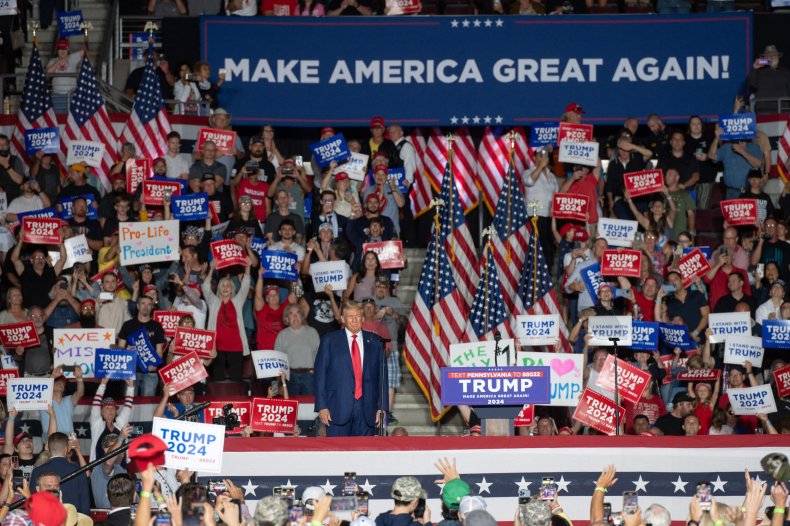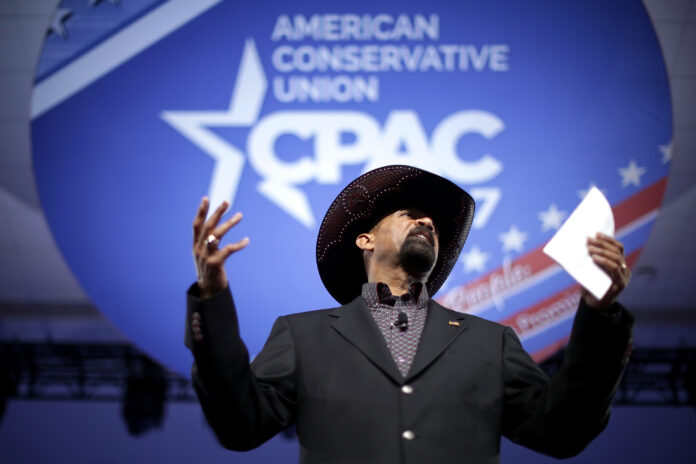The divide between candidates favored by the Republican establishment and those favored by former President Donald Trump’s Make America Great Again (MAGA) base continues to grow as the MAGA faithful go after wealthy Republican candidates with the ability to self-fund their campaigns.
This clash threatens to further tear at the fabric of the GOP’s identity going into the 2024 election season.
On one side, the National Republican Senatorial Committee (NRSC) has “placed an emphasis” on recruiting candidates who can finance their races, as reported by Politico in March. In 2020, then-NRSC Executive Director Kevin McLaughlin said his party could mitigate its underperformance among small-dollar donors by “recruiting strong candidates who can both self-fund and win general elections.”
But former Milwaukee County Sheriff David Clarke, a Trump ally and potential GOP candidate for the 2024 Senate race in Wisconsin, blasted this strategy in an April episode of his podcast, elaborating further on the issue in a statement to Newsweek.
“My initial reaction to that statement is that it is tone deaf,” Clarke said. “The Republican Party has an image problem. The Democrats have painted them as the Party of the rich and a good old boy club of white males. Say what you want but there is some truth to that visually.”
“The GOP needs a face lift,” he added, “and that won’t happen when GOP Party officials make statements to that effect that basically eliminates minority and women candidates.”
Photo by Chip Somodevilla/Getty Images
This strategy follows the NRSC’s underperformance during the 2022 election cycle when Trump-endorsed candidates lost in three critical swing states. Senate Republican Leader Mitch McConnell, who Trump has called a “pawn for the Democrats” and Clarke has said is “full of s***,” attributed the defeats to “candidate quality” problems.” The NRSC declined to comment for this piece.
In response, the NRSC has successfully recruited two candidates who are wealthy enough to potentially fund their own campaigns. Governor Jim Justice, a coal magnate, will look to flip the West Virginia seat held by Democratic Senator Joe Manchin, and Tim Sheehy, an aerospace company founder, will challenge Montana’s Democratic Senator Jon Tester. In Wisconsin, Eric Hovde, a real estate executive, is weighing a bid to challenge Democratic Senator Tammy Baldwin. Hovde could face Clarke in a primary.
“This approach excludes me,” Clarke told Newsweek. “I am not filthy rich, although I have significant support from grass roots voters. Even if that is not their intention, and I don’t think it is, it is a bad look. It is time to prune away the dead wood of the Republican establishment and make way for the growth of a new Republican Party.”
Clarke, who originally ran for sheriff as a Democrat and held the position from 2002 to 2017, became a conservative commentor and vocal supporter of Trump over the course of the latter’s presidency. Trump considered Clarke for a senior position at the Department of Homeland Security.
As the appointment faced delays, Clarke ultimately chose to rescind his acceptance of the offer, with an adviser of his saying the former sheriff wanted to be in a position where he could “promote the president’s agenda in a more aggressive role.” Clarke has gone on to defend attendees of January 6 and has promoted Trump’s claims of a stolen election. A national GOP strategist voiced serious concerns about a Clarke primary victory.
“National Republicans believe David Clarke would be a disastrous candidate who would completely take Wisconsin off the 2024 map not just at the Senate level, but the presidential as well,” the strategist, who provided the comment on the condition of anonymity, told Newsweek.
The former sheriff is not the only candidate with MAGA credibility to take shots at an NRSC-recruited candidates finances. Republican Congressman Alex Mooney, who’s running for the West Virginia Senate seat, has called Justice the “king of scandals” due to reports of the mounting debt, unpaid fines, and other financial troubles the governor’s businesses have faced.
Montana Congressman Matt Rosendale, who received Trump’s endorsement for a failed 2018 Senate bid and is weighing a second bid in 2024, called Sheehy a protector of the “DC cartel,” linking him to McConnell and “the party bosses.”

Photo by JOED VIERA/AFP via Getty Images
Jörg Spenkuch, a professor at Northwestern University’s Kellogg School of Management who specializes in political economics, said the tension playing out between these MAGA-aligned candidates and their wealthy counterparts represents the broader struggle playing out in the Republican party between its traditional donor class and the populist base that has grown in influence alongside the emergence of Trump.
While populist candidates like Clarke, who boycott corporations they deem liberal and scrutinize the influence of corporate lobbyists, may have messages that appeal to a grassroots base, these messages do not always fare well with businesses and wealthy individuals that Republicans have traditionally relied upon. As Democrats have outraised Republicans in small-dollar donations over the past two election cycles, Spenkuch said the party faces difficult decisions.
“If I were a Republican strategist, I would think long and hard—’Can I perhaps win over a different segment of donors if I stay populist, or do I need to dial back the populism a little bit to get back into the good graces of the traditional donor class?'” Spenkuch told Newsweek. “I don’t really know the answer to that, and I’m not sure anyone really does.”
Spenkuch added that the recruitment of wealthy candidate appears to be the GOP’s answer to falling behind in the small-donor race. However, he warns that Republicans should be “very cautious” about this strategy because he said it’s not clear whether wealthy candidates resonate with the GOP base. Spenkuch points to celebrity physician Mehmet Oz’s failed Senate bid in Pennsylvania as a recent example of the strategy failing.
When it comes to the balance between popular ideas and money, Alvin Tillery Jr., a professor and director of the Center for the Study of Diversity and Democracy at Northwestern’s Weinberg College of Arts and Sciences, said he sees ideas as the bigger factor shaping GOP success in upcoming elections.
Tillery dismissed Clarke’s notion that the GOP’s emphasis on recruiting candidates who can self-fund as a reason why the party may struggle to recruit women and minority candidates. Instead, he said that struggle is because many of their ideas are unpopular with those groups.
While conservative causes, like Trump’s legal defense fund, have garnered small-dollar donations from the party’s base, Tillery believes Republicans have struggled to best Democrats in the small-dollar fundraising race because their ideas are less popular to a wider share of the American electorate. He pointed to Trump, the first reported billionaire president, as an example, with Trump being someone whose ideas became the focus of his 2020 campaign loss as opposed to his wealth.
“The worship of wealth, I think, is pretty ubiquitous in the American system, so I don’t think the ‘little guys versus the billionaire self-funders’ is going to be the wedge issue in the Republican primary,” Tillery told Newsweek.
“As the Republicans continue to stay with radically unpopular ideas, like anti-wokeness and opposing women’s reproductive rights,” he added, “I think the ability to find candidates that can pay for themselves is going to help be an equalizer for them.”


